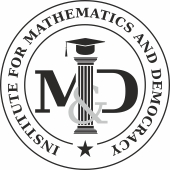Summer 2025 Undergraduate Research at IMD
This summer, three Wellesley students will examine various ways mathematics plays a pivotal yet underappreciated role in democracy.
Lydia Byers is part of Wellesley College’s Class of 2028 and a prospective mathematics and classical civilizations major. She is interested in how math can be used to benefit voter representation and help voters make informed decisions about their governments.
Bianca Fiore is a rising sophomore in the class of 2028. She is a prospective double major in Political Science and Mathematics. Bianca is interested in ways math can be applied to political science. As an IMD fellow, she hopes to further explore how mathematical analysis can explain the advantages and disadvantages of different political systems.
Chuming (Mimi) Wu is a member of the class of 2027 in Wellesley College majoring in philosophy and economics. Her favorite parts about the intersection between mathematics and politics are voter theory, game theory and gerrymandering. She is excited to join IMD assisting and learning more about research on democracy and voting systems.
The goal of Lydia, Bianca, and Mimi’s project is to study certain outward-facing aspects of democracy through a mathematical lens and think about our daily interactions with democratic and political processes in an objective way. The main question is whether we are using the best mathematics to design and conduct our democracy, and if not, what should these processes be replaced by.
Some particular topics the students will look at are:
- Measuring democracy (quantifying the notion of a “good” and “bad” democracy, representativeness, fairness; democracy indicators and indices; public opinion and polling)
- Power and influence (quantifying power of individuals, institutions, and coalitions; measuring centrality and influence in political systems)
- Conflict and negotiation (game-theoretic approach to understanding political conflict, war, negotiation, diplomacy, strategy, cooperation, war, and consensus)
- Web of democracy (networks, information flow, polarization, opinion dynamics)
- Statistics as a political tool (manipulation of stats for political gain, by politicians or media)
- Data and algorithms (impact of big data and AI on power dynamics; algorithmic bias)
- Digital democracy (new tools for enabling political participation, like sortition, citizen assemblies, participatory budgeting)
Their research will be supervised by Prof. Ismar Volić from Wellesley College.



